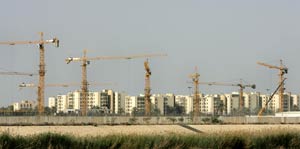Military freedom to watch
 There is a feeder story in the Times Online about the new US embassy in Iraq.
There is a feeder story in the Times Online about the new US embassy in Iraq.Officially, the design of the compound is supposed to be a secret, but you cannot hide the giant construction cranes and the concrete contours of the 21 buildings that are taking shape.
One question puzzles and enrages the Iraqis: how is it that the Americans cannot keep the electricity running in Baghdad for more than a couple of hours a day, yet still manage to build themselves the biggest embassy on Earth?
Size = 42-hectare (104-acres)
Cost (so far) = $592 million (£312 million)
The second question is, 'What is the purpose of this building, anyways?'
Here's a clue.
The story is the US will create a wireless net for all of Iraq. That's a good thing - freedom of speech - access to information - blogging - letting the world no what it's like to live in a democracy.
But a bigger story is that DARPA is issuing RFPs for WIFI enabled cyborg-insect drones (UAVs) create the most watched and listened to country on earth.
There is (naturally) a requirement that U.S.-based CDMA technology be installed. Some wireless analysts have criticized the plan as being out of step with most other wireless services in the Middle East, potentially creating problems with roaming.
Like the US military want roaming ....
US lawmakers suggest that CDMA is more compatible with delivering broadband and upcoming third-generation wireless services than GSM. The people are going to expect, going to want the advanced broadband.
Means to an end?
This is a true 'technology giveth - technology taketh away' situation. This will take the London case-study to a new level and not a very encouraging one.
To many, the development of CCTV in public areas, linked to computer databases of people's pictures and identity, presents a serious breach of civil liberties. Critics fear the possibility that one would not be able to meet anonymously in a public place or drive and walk anonymously around a city.
Demonstrations or assemblies in public places could be affected as the state would be able to collate lists of those leading them, taking part, or even just talking with protesters in the street.
In this case, Iraq will be monitored wall to wall with sound and video. Even the possibility to follow and get into those places that would normally be blind-sited ... like private backyards and possibly even inside buildings.
Gatekeepers? Oh ... here's one ....
The UrbanEye Project will measure the effects on society and allow the public to see the reports and outcomes but look at the partners ... don't see what I see? Look a bit closer.
There's always another story behind the story.

 Handbook for bloggers and cyber-dissidents (PDF 1.2 MB)
Handbook for bloggers and cyber-dissidents (PDF 1.2 MB)
0 Comments:
Post a Comment
<< Home